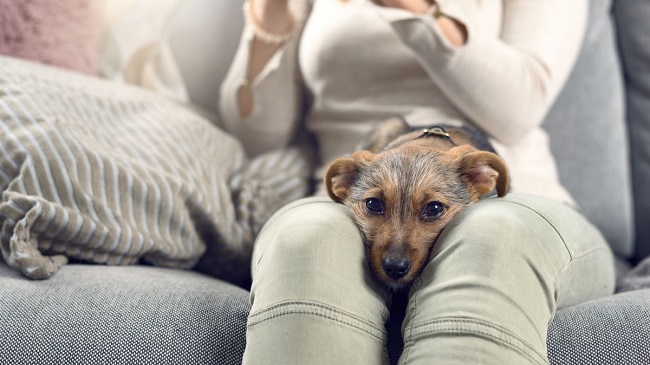If you’ve ever found yourself wondering, “Why does my dog sit on me?”, you’re not alone. This behavior, common amongst many dogs, often leaves owners amused and baffled. It may seem peculiar, but like all canine behavior, it serves a purpose.
This comprehensive guide will delve into the various reasons why your four-legged companion might choose to park themselves on you.

Why Does My Dog Sit on Me
Here are some reasons why my dog sit on me:
Read Also:
Seeking Affection
Dogs are naturally affectionate animals and sitting on you can be their way of getting closer. Dogs thrive on human touch, and the physical contact they receive from sitting on their owner can be comforting and reinforcing.
Marking Territory
Dogs have a strong instinct to mark their territory. Sitting on you could be their way of saying to other pets, “This human is mine!” Your dog’s scent left on you may deter other dogs from trying to get your attention.
Dominance
In some cases, a dog sitting on you can be a sign of dominance. If your dog frequently tries to assert their will over you, such behavior might be a dominance issue. However, this is less common, and most dogs sit on their owners purely for affection or comfort.
Seeking Warmth and Comfort
Like their wolf ancestors, dogs are pack animals. They enjoy the warmth and comfort that comes from snuggling up to members of their pack – in this case, you!
Seeking Attention
If your dog sits on you and then gives you “those eyes,” it’s clear they’re vying for your attention. This behavior is particularly common in dogs who feel they haven’t been getting enough attention.
Understanding Your Dog’s Behavior
Understanding why your dog chooses to sit on you can lead to deeper communication and bonding. However, if this behavior becomes troublesome or is linked to dominance issues, it may be worth discussing with a veterinarian or dog behaviorist.
Signs of Anxiety or Fear
In some cases, dogs may sit on their owners due to anxiety or fear. This can be triggered by various factors such as loud noises, unfamiliar environments, or separation anxiety. The close contact helps to calm their nerves and gives them a sense of security.
If your dog exhibits this behavior frequently, especially during situations that may be stressful for them, it’s crucial to consult with a veterinarian or pet behaviorist to help manage their anxiety.
Your Dog’s Breed and Temperament
Breed and temperament can also influence your dog’s behavior. Some breeds are more inclined to be “lap dogs,” regardless of their size.
For example, small breeds like Chihuahuas and large breeds like Great Danes are known for this behavior. Dogs with a very affectionate or needy temperament may also be more prone to sitting on you.
Socialization and Training
Early socialization and training can influence a dog’s behavior. Dogs that are well socialized from a young age are likely to be more comfortable around humans and may express this by sitting on or near their owners.
On the other hand, lack of proper training could also lead to this behavior, especially if your dog hasn’t been taught boundaries.
Read Also:
Conclusion
While the sight of your dog sitting on you may provoke a laugh or a photo opportunity, remember that it’s also a form of communication. Whether they’re seeking affection, marking territory, asserting dominance, seeking comfort, or wanting attention, your dog is trying to tell you something.
So, the next time you wonder, “Why does my dog sit on me?”, consider these possibilities and appreciate the unique ways your canine companion communicates with you.
























